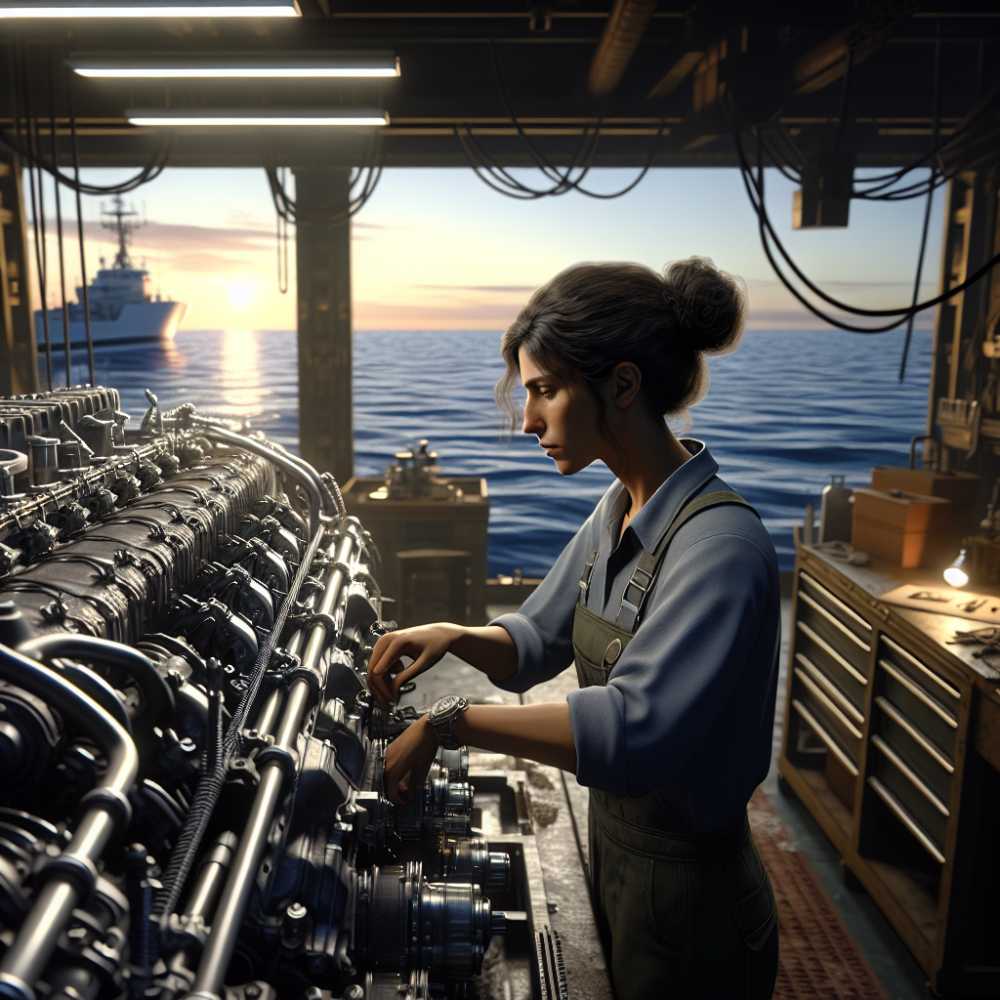Overview of Marine Engineering Job Description
Marine engineering is a specialized field that involves the design, construction, and maintenance of ships, boats, and other marine vessels. It is a crucial profession that plays a vital role in the maritime industry. In this article, we will provide an overview of the marine engineering job description, highlighting the key responsibilities and skills required for this profession. One of the primary responsibilities of a marine engineer is to design and develop various systems and equipment used in marine vessels. This includes propulsion systems, electrical systems, and navigation systems. They must ensure that these systems are efficient, reliable, and meet all safety standards. Additionally, marine engineers are also involved in the construction and installation of these systems on board the vessels. Another important aspect of a marine engineer’s job is to conduct regular inspections and maintenance of marine vessels. They are responsible for identifying and resolving any mechanical or technical issues that may arise. This requires a thorough understanding of the various components and systems of a ship. Marine engineers must also stay updated with the latest technological advancements in the field to ensure that the vessels they work on are equipped with the most advanced and efficient systems. Safety is a top priority in the maritime industry, and marine engineers play a crucial role in ensuring the safety of the crew and passengers on board. They are responsible for conducting safety drills and inspections to ensure that all safety protocols are followed. In the event of an emergency, marine engineers must be able to respond quickly and effectively to mitigate any potential risks. In addition to technical skills, marine engineers must also possess strong analytical and problem-solving abilities. They often encounter complex technical issues that require innovative solutions. They must be able to analyze data, identify the root cause of a problem, and develop effective strategies to resolve it. Attention to detail is also essential in this profession, as even a small error in design or maintenance can have significant consequences. Communication and teamwork are also important skills for marine engineers. They often work as part of a team, collaborating with other professionals such as naval architects and shipbuilders. Effective communication is crucial to ensure that everyone is on the same page and that projects are completed successfully. In conclusion, marine engineering is a challenging and rewarding profession that requires a diverse set of skills. From designing and developing systems to conducting inspections and maintenance, marine engineers play a vital role in the maritime industry. Their expertise ensures the safety and efficiency of marine vessels, contributing to the smooth operation of the industry as a whole. If you have a passion for engineering and a love for the sea, a career in marine engineering may be the perfect fit for you.Key Responsibilities of a Marine Engineer
Marine engineering is a specialized field that involves the design, construction, and maintenance of ships, boats, and other marine vessels. It is a crucial profession that ensures the safe and efficient operation of these vessels, as well as the safety of the crew and passengers on board. In this article, we will explore the key responsibilities of a marine engineer and the skills required to excel in this field. One of the primary responsibilities of a marine engineer is to oversee the design and construction of marine vessels. This involves working closely with naval architects and other professionals to ensure that the vessel meets all safety and performance requirements. Marine engineers must have a deep understanding of ship systems, including propulsion, electrical, and hydraulic systems, to ensure that they are properly integrated into the vessel’s design. Once a vessel is built, marine engineers are responsible for its maintenance and repair. This includes conducting regular inspections to identify any potential issues and performing necessary repairs to keep the vessel in optimal condition. Marine engineers must also stay up to date with the latest technological advancements in the field to ensure that the vessel is equipped with the most efficient and reliable systems. In addition to design and maintenance, marine engineers are also responsible for the operation of the vessel. They work closely with the ship’s captain and crew to ensure that all systems are functioning properly and that the vessel is operating safely. This involves monitoring various parameters, such as fuel consumption, engine performance, and environmental conditions, to make necessary adjustments and ensure the vessel’s efficiency. Another important responsibility of a marine engineer is to ensure compliance with all relevant regulations and standards. This includes adhering to international maritime laws, as well as industry-specific regulations. Marine engineers must have a thorough understanding of these regulations and ensure that the vessel meets all requirements to operate legally and safely. To excel in this field, marine engineers must possess a wide range of skills and knowledge. They must have a strong background in engineering principles, including mechanical, electrical, and naval architecture. They must also have excellent problem-solving skills and the ability to think critically in high-pressure situations. Communication skills are also crucial for marine engineers, as they often work as part of a team and must effectively communicate with other professionals, such as naval architects, shipbuilders, and crew members. They must also be able to communicate complex technical information to non-technical individuals, such as ship owners or regulatory authorities. In conclusion, marine engineering is a challenging and rewarding profession that involves the design, construction, and maintenance of marine vessels. The key responsibilities of a marine engineer include overseeing the design and construction of vessels, maintaining and repairing them, operating them safely, and ensuring compliance with regulations. To excel in this field, marine engineers must possess a strong background in engineering principles, excellent problem-solving and communication skills, and a commitment to staying up to date with the latest technological advancements.Skills and Qualifications Required for Marine Engineering

Marine engineering is a specialized field that requires a unique set of skills and qualifications. Professionals in this field are responsible for designing, building, and maintaining various types of marine vessels and structures. From ships and submarines to offshore platforms and underwater vehicles, marine engineers play a crucial role in the maritime industry. To excel in this demanding profession, individuals must possess a combination of technical expertise, problem-solving abilities, and a strong understanding of marine systems. One of the most important skills for marine engineers is a solid foundation in mathematics and physics. These subjects form the basis of engineering principles and are essential for designing and analyzing marine structures. From calculating buoyancy and stability to understanding fluid dynamics and thermodynamics, a strong grasp of these concepts is crucial for success in this field. Additionally, proficiency in computer-aided design (CAD) software is essential for creating detailed plans and models of marine structures. In addition to technical skills, marine engineers must also possess strong analytical and problem-solving abilities. They are often faced with complex challenges that require innovative solutions. Whether it’s designing a more efficient propulsion system or finding ways to reduce fuel consumption, marine engineers must be able to think critically and come up with creative solutions. This requires a deep understanding of engineering principles and the ability to apply them in practical situations. Communication skills are also vital for marine engineers. They often work as part of a team, collaborating with other professionals such as naval architects, electrical engineers, and shipbuilders. Effective communication is essential for ensuring that everyone is on the same page and that projects are completed successfully. Marine engineers must be able to clearly convey their ideas and instructions to others, both verbally and in writing. Attention to detail is another important skill for marine engineers. The design and construction of marine structures require precision and accuracy. Even the smallest error can have serious consequences, so marine engineers must be meticulous in their work. They must carefully review plans and specifications, double-check calculations, and ensure that all safety regulations and industry standards are met. In terms of qualifications, a bachelor’s degree in marine engineering or a related field is typically required for entry-level positions. Some employers may also prefer candidates with a master’s degree or additional certifications. Practical experience is also highly valued in this field. Many marine engineers gain hands-on experience through internships or co-op programs while in school. This allows them to apply their knowledge in real-world settings and develop practical skills. In conclusion, marine engineering is a challenging and rewarding profession that requires a unique set of skills and qualifications. From a strong foundation in mathematics and physics to analytical thinking and attention to detail, marine engineers must possess a diverse range of abilities. Effective communication and practical experience are also important for success in this field. By acquiring the necessary skills and qualifications, individuals can embark on a fulfilling career in marine engineering and contribute to the advancement of the maritime industry.





